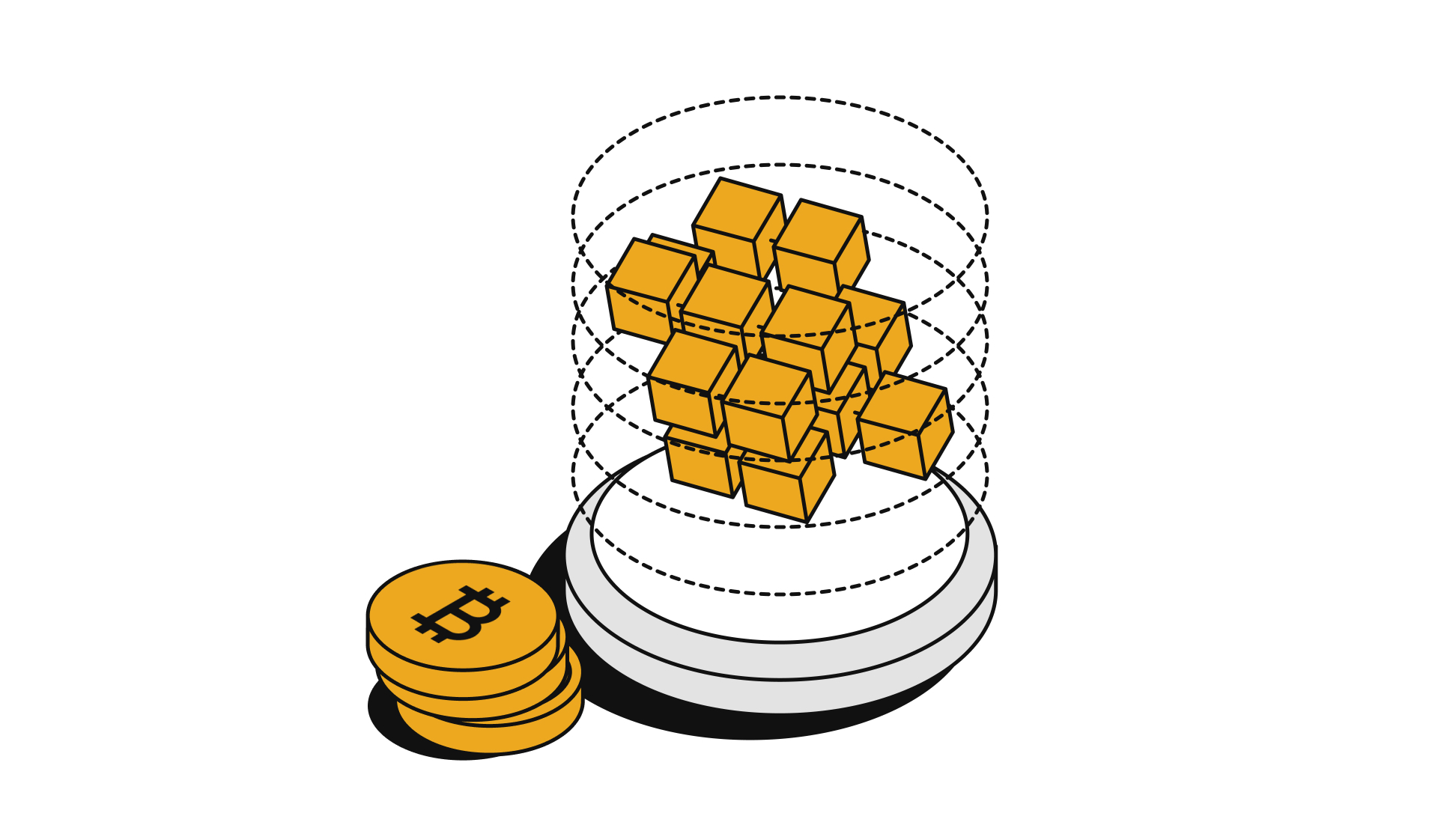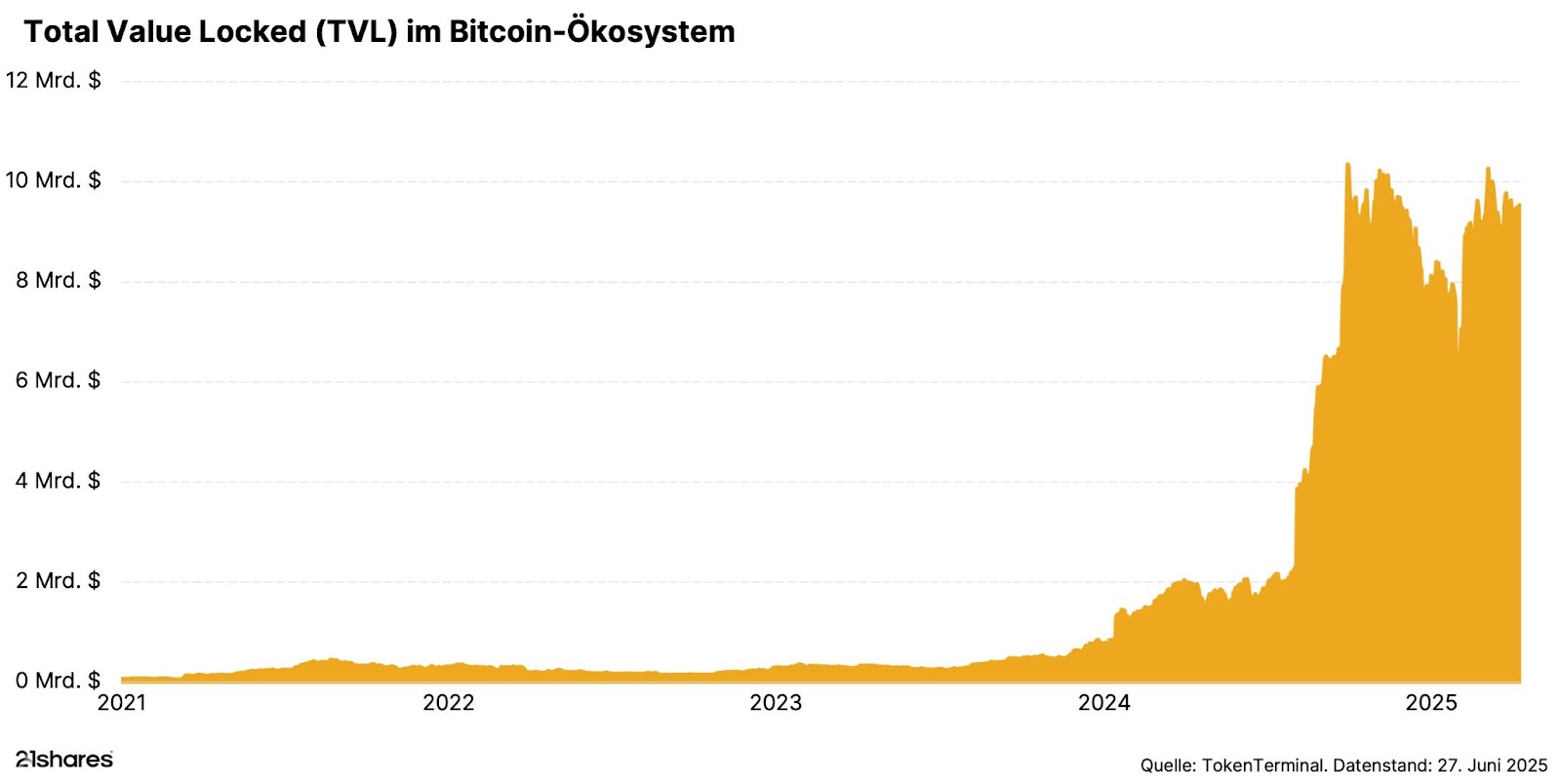Mehr als digitales Gold: Bitcoin betritt die DeFi-Welt



Von Karim AbdelMawla
Bitcoin (BTC) gilt weithin als Wertspeicher – oft wird es mit digitalem Gold verglichen. Im Gegensatz zu Blockchains wie Ethereum, auf denen Entwickler eine Vielzahl von Anwendungen aufbauen können, wurde Bitcoin lange Zeit kaum für mehr als das bloße Halten genutzt.
Doch das ändert sich gerade.
Im Jahr 2025 gewinnt eine neue Bewegung an Dynamik: Bitcoin Finance, kurz BTC-Fi. Was einst als Nebenprojekt begann, entwickelt sich nun zu einem ernstzunehmenden Bestandteil des Krypto-Ökosystems.

Ein deutliches Zeichen für diesen Wandel ist der rasante Anstieg des sogenannten Total Value Locked (TVL) – also der Gesamtwert der Vermögenswerte, die in dezentralen Finanzanwendungen (DeFi) hinterlegt sind. Dabei handelt es sich um Plattformen, auf denen Nutzer Zinsen verdienen, Vermögenswerte handeln oder Kredite vergeben können – ganz ohne Banken.
Der TVL von BTC-Fi ist von gerade einmal 30 Millionen US-Dollar Anfang 2024 auf fast 10 Milliarden US-Dollar Mitte 2025 gestiegen. Das zeigt: Bitcoin ist längst mehr als ein sicherer Hafen – es wird zur Basis einer neuen, offenen Finanzwelt.
Und das Potenzial ist enorm: Weniger als 2 % des gesamten Bitcoin-Markts (aktuell rund 2,1 Billionen US-Dollar) sind derzeit in DeFi-Anwendungen eingebunden. Sollte dieser Anteil auf nur 5 bis 10 % steigen, könnte BTC-Fi sogar größer werden als der heutige Ethereum-DeFi-Sektor.
Warum Bitcoin Finance (BTC-Fi) für Anleger so relevant ist
BTC-Fi verändert die Spielregeln: Zum ersten Mal können Bitcoin-Inhaber mit ihrem BTC Einkommen erzielen – ohne es verkaufen zu müssen.
Das ist groß.
- Für institutionelle und private Investoren bedeutet das: Sie können Renditen erzielen, indem sie ihr Bitcoin aktiv einsetzen.
- Für Entwickler und die Krypto-Community eröffnet sich ein neuer, hochwertiger Collateral-Typ: Bitcoin als vertrauenswürdiges und weit verbreitetes Asset findet nun auch in dezentralen Anwendungen Verwendung.
Neue Plattformen treiben BTC-Fi voran
- Babylon hat fast 49.000 BTC für Staking in sein System integriert – ein Mechanismus zur Belohnung von Netzwerkteilnehmern.
- Stacks ermöglicht erstmals Smart Contracts auf Bitcoin und hat bereits über 5.000 BTC über den sBTC-Token gesichert.
- Solv Protocol bietet renditebasierte BTC-Produkte an und hat kürzlich die Marke von 500 Millionen US-Dollar TVL überschritten.
- Maple Finance bringt institutionelles Kapital in die BTC-Fi-Welt: Mit BTC-basierten Kreditlösungen und Yield-Angeboten nähert sich das TVL der Plattform den 1,7 Milliarden US-Dollar.
- Threshold Network nutzt seine Version von Bitcoin, tBTC, in bekannten Lending-Protokollen wie Aave.
- B² Network arbeitet an Rollups für Bitcoin, um das Netzwerk zu skalieren und mehr Nutzer in den DeFi-Bereich zu bringen.
DeFi ist nicht mehr nur Ethereums Spielfeld
Was Ethereum für andere Token aufgebaut hat, baut Bitcoin nun für sich selbst – ohne die Stabilität oder Sicherheit seines Netzwerks zu gefährden.
BTC-Fi ist keine Modeerscheinung, sondern ein echter Strukturwandel, der Bitcoins Rolle in einer vernetzten, multichain-fähigen Krypto-Zukunft neu definiert. Wenn du Bitcoin hältst, ist das eine Entwicklung, die du im Auge behalten solltest.
This report has been prepared and issued by 21Shares AG for publication globally. All information used in the publication of this report has been compiled from publicly available sources that are believed to be reliable, however, we do not guarantee the accuracy or completeness of this report. Crypto asset trading involves a high degree of risk. The crypto asset market is new to many and unproven and may have the potential not to grow as expected.Currently, there is relatively small use of crypto assets in the retail and commercial marketplace in comparison to relatively large use by speculators, thus contributing to price volatility that could adversely affect an investment in crypto assets. In order to participate in the trading of crypto assets, you should be capable of evaluating the merits and risks of the investment and be able to bear the economic risk of losing your entire investment.Nothing herein does or should be considered as an offer to buy or sell or solicitation to buy or invest in crypto assets or derivatives. This report is provided for information and research purposes only and should not be construed or presented as an offer or solicitation for any investment. The information provided does not constitute a prospectus or any offering and does not contain or constitute an offer to sell or solicit an offer to invest in any jurisdiction. The crypto assets or derivatives and/or any services contained or referred to herein may not be suitable for you and it is recommended that you consult an independent advisor. Nothing herein constitutes investment, legal, accounting or tax advice, or a representation that any investment or strategy is suitable or appropriate to your individual circumstances or otherwise constitutes a personal recommendation. Neither 21Shares AG nor any of its affiliates accept liability for loss arising from the use of the material presented or discussed herein.Readers are cautioned that any forward-looking statements are not guarantees of future performance and involve risks and uncertainties and that actual results may differ materially from those in the forward-looking statements as a result of various factors.This report may contain or refer to material that is not directed to, or intended for distribution to or use by, any person or entity who is a citizen or resident of or located in any locality, state, country or other jurisdiction where such distribution, publication, availability or use would be contrary to law or regulation or which would subject 21Shares AG or any of its affiliates to any registration, affiliation, approval or licensing requirement within such jurisdiction.









_logo.svg)
.svg.png)